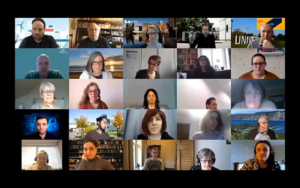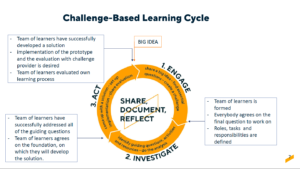Summary Workshop Basic Principles in CBL Jan 27th 2021
Let us just do it together!
Let us do Challenge-Based Learning in international teams, embedded or extracurricular, on a weekend or over the whole term – although corona crises still prevent mobility, all meetings have to be online, no final credential system exist or peer assessment formats are not part of official regularities. The best practice examples of the first pilot from six universities of the ECIU network showed that it is possible! That there are still many open questions and a high demand for exchange before starting in pilot two was shown by the almost 120 participants from 11 universities of the ECIU network joining an introduction workshop to Challenge-Based Learning (CBL) on January 27th 3-5 pm (CET).
embedded or extracurricular, on a weekend or over the whole term – although corona crises still prevent mobility, all meetings have to be online, no final credential system exist or peer assessment formats are not part of official regularities. The best practice examples of the first pilot from six universities of the ECIU network showed that it is possible! That there are still many open questions and a high demand for exchange before starting in pilot two was shown by the almost 120 participants from 11 universities of the ECIU network joining an introduction workshop to Challenge-Based Learning (CBL) on January 27th 3-5 pm (CET).
The workshop was organized by CBL experts and actions leads of Work Package “Challenge-Based Education” (WP3) of Hamburg University of Technology and the Teaching Enhancement Unit (TEU) in Dublin City University (DCU). DCU is very grateful to learn from our ECIU colleagues, as in addition to the ECIU university CBL forms a core element also of a €20 million nationally funded project called DCU Futures. Both project involves working with industry partners to design programmes that future-proof graduates. But an active workshop with lively discussion would not be possible with the large number of contributors, so we made good use of Break-out Sessions with a total of 10 across the workshop.
 After a very short ride through the definition of CBL and CBL learning Cycle all could choose between four Break-out Sessions Deiric Ó Broin, DCU and Frank van den Berg, UTwente shared their experiences in “How to write a challenge?” while Dorothea Ellinger, TUHH invited to a discussion about Constructive Alignment which is an important concept but has to be rethought since it is much up to the students’ own responsibilities to drive the learning toward some self-governing and internalized learning outcomes. In parallel Vilma Sukacke, KTU discussed the core principles of enhancing CBL with technology and provides examples while Siska Simon, Marisa Hammer & Michelle Schulze, TUHH shared their experiences with a 3D learning environment to overcome difficulties motivating teams online.
After a very short ride through the definition of CBL and CBL learning Cycle all could choose between four Break-out Sessions Deiric Ó Broin, DCU and Frank van den Berg, UTwente shared their experiences in “How to write a challenge?” while Dorothea Ellinger, TUHH invited to a discussion about Constructive Alignment which is an important concept but has to be rethought since it is much up to the students’ own responsibilities to drive the learning toward some self-governing and internalized learning outcomes. In parallel Vilma Sukacke, KTU discussed the core principles of enhancing CBL with technology and provides examples while Siska Simon, Marisa Hammer & Michelle Schulze, TUHH shared their experiences with a 3D learning environment to overcome difficulties motivating teams online.
In second half, all participants had a choice between six Break-out Session in that partner of the network presented their best practice, followed by a plenary discussion. Gesa Mayer, TUHH gave insights into a non-technical CBL-Seminar with engineering students addressing accessibility of e-learning while Nelly Karimi, U Stavanger summarized her experiences running CBL through InGenious in last two semesters and the pilot project together with Twente and Linköping university in the fall semester. Raul Berlanga and Joni Ramu, UTampere gave a lot of practical tips and tools on how to successfully conduct a challenge. In parallel, Elena Tsigki, Luuk Buunk, Nikola Petrová, Leonie Bosch-Chapel and Frank van den Berg, UTwente told their story how 33 international students, from 6 Universities and 20 different study programs, working on 7 challenges, coached by 7 teamchers and stakeholders, gained knowledge and improved their skills through 6 thematic weekends involving 7 Skills labs. Sara Moreno Pires and José Manuel Martins, UAveiro shared the process, (some) results, doubts and challenges of the pilot CBL experience in the MSc of Regional and Urban Planning. In the last session, addressing the seminar “Artificial intelligence and decision making” Visvaldas Varžinskas, Margiris Burakauskas and Agnė Paulauskaitė-Tarasevičienė, KTU explained how they were solving the challenge provided by Kaunas City Municipality „Efficient management of resources in Kaunas city“.
The workshop closed with a plenary discussion in which e.g. the question about largest pitfalls were asked and someone answered with “FAIL = first attempt in learning”. Although not all question could be addressed completely, we are sure the workshop inspired just to do the first steps in Challenge-Based Learning and engage in a growing community of practice.
Looking forward to lots more conversations and developments around CBL!
Author information and contact:
dorothea.ellinger@tuhh.de